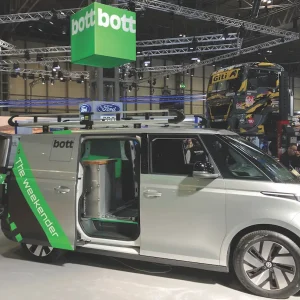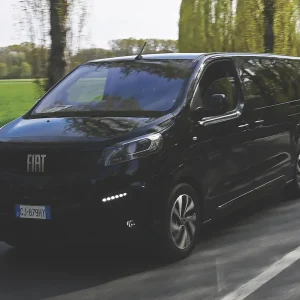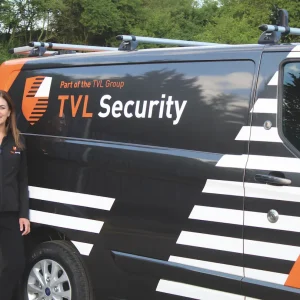Sales in the crucial 2.5-3.5t sector covering medium and large vans, which accounts for more than 60% of the total LCV market, dropped 3.1% to 225,837 units in 2017 compared to the previous year, despite an encouraging monthly performance in December, when volumes increased 7.5% to 18,171.
In light of the ongoing political and economic turmoil this now looks like an impressively resilient showing, but it remains to be seen whether shaky business confidence will lead to operators putting off fleet renewal decisions as the year progresses.
A pair of large vans, the Ford Transit and Mercedes Sprinter, were in the top three best-selling vans of 2017 with respective registrations of 27,062 and 23,588, and they were joined in the top 10 by a third, the Peugeot Boxer, which recorded 14,062 sales.
The Sprinter’s strong performance is particularly noteworthy as the current model is on run-out, with the new van set to arrive in the first quarter of this year.
In December, the Sprinter was the UK’s second biggest-selling LCV (behind the Ford Transit Custom), with 2,500 units shifted. This put it comfortably ahead of the Transit, which racked up sales of 1,674 for the month.
Mercedes has big plans for its new large van as it looks to seize back the initiative in the sector. The brand will be determined not to be overshadowed by its great rival Volkswagen, which received rave reviews for its new Crafter, including winning the What Van? Light Commercial Vehicle of the Year 2018. The Crafter’s predecessor, of course, was built on the same platform as the current Sprinter.
Mercedes says the next-generation Sprinter will break new ground by embracing a raft of innovations covering electric drivetrains, connectivity systems and bespoke loading solutions.
As part of its so called ‘adVANce’ initiative, the manufacturer has developed Pro-connect internet-based fleet management connectivity to improve communication between fleet managers and drivers.
The brand claims body variants, wheelbases, load height, stowage concepts, interior versatility and infotainment systems could be adapted to myriad individual requirements, and says the van will be equally at home on a construction site or operating as a VIP shuttle. It adds that a diverse range of ex-factory bodystyles will also be available. Mercedes confirmed it would introduce an electric eSprinter in 2019.
VW, meanwhile, has begun rolling out automatic, rear- and all-wheel drive 4Motion derivatives of its Crafter to join the front-wheel drive manual it launched in May of last year.
The CR35 eight-speed automatic FWD Crafter went on sale with the 177hp derivative of the 2.0-litre diesel engine that powers the whole range in September in both panel van and chassis cab modes. The 140hp auto will join the line-up in both body shapes in the first quarter of 2018.
The 4Motion van and chassis cab CR35 Crafters also went on sale in September with manual transmission, but customers after the auto will have to wait until the third or fourth quarter of 2018.
The RWD CR35, meanwhile, will be available from the second quarter of 2018 with the 177hp engine and manual transmission, but will not be offered as an automatic.
Volkswagen has started trialling its e-Crafter electric van with four fleets in the UK, including Gatwick Airport, with a view to using customer feedback to shape the final design of the vehicle. VW says the plug-in model, which is expected to come to market in September this year, has a range of about 100 miles, a load volume of 10.9m3 and a payload of at least 1.0t.
As part of its Daily Blue Power initiative to offer low-emission vans to urban operators, Iveco has supplied three Daily Natural Power compressed natural gas (CNG) vans to waste management firm Veolia. The vans carry specialist equipment for removing graffiti under a new contract with the London Borough of Camden.
The models spark-ignition engines are claimed to deliver performance comparable to a diesel in terms of power, torque and response, but produce 12% fewer NOx emissions, 76% less particulate matter and up to 95% fewer CO2 emissions.
Finally, SAIC-owned LDV is to introduce Euro6-compliant engines to its V80 in April. Since the Euro6 emissions standard became mandatory for new LCVs in September, Harris Automotive, which distributes the brand in the UK and Ireland, has been marketing the Euro5 V80 under an IVA (Individual Vehicle Approval) classification – a legal category that is more commonly used to cover LCV conversions.
Timeline
- Volkswagen Crafter C35 4Motion (September 2017)
- Volkswagen Crafter C35 FWD 177hp Automatic (September 2017)
- Mercedes-Benz Sprinter (March 2018)
- Volkswagen Crafter C35 FWD 140hp Automatic (March 2018)
- LDV V80 Euro 6 (April 2018)
- Volkswagen Crafter C35 RWD 177hp Manual (April 2018)





